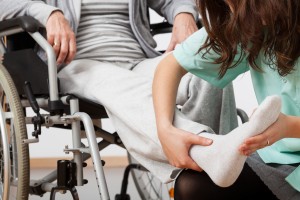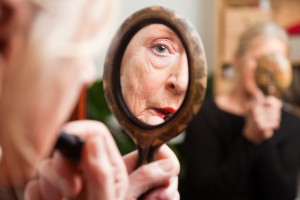
The number of pieces of writing about the health of older adults (typically taken as aged over 60 years) that begin by stating how the number of older adults is increasing is increasing. It’s increasing right now in fact. The number of people aged over 60 is currently estimated to be more than 800 million with projections indicating that this figure will increase to over 2 billion in 2050.
While many older people have good health, getting older can bring its own set of challenges. Older adults are at increased risk for more limited mobility, frailty or other physical or mental health problems. It is estimated that approximately 20% of adults in the USA aged over 55 years and two-thirds of older people in hospital have some form of mental health problem. The rising number of older adults relative to the rest of the population means there is an increasing number of older adults with mental distress. There’s an increasing number of older adults with most kinds of problems (that’s how proportions work), but the focus here is on how best to support older people with mental illness.
Just as with adults with a few less years under their belts (and over their belts, time is not belt-limited) a number of social, demographic, psychological, and biological factors contribute to a person’s mental health status. Many of these factors are particularly pertinent amongst older adults. The rising number of older people with mental health problems makes the effective use of resources to manage these factors and to support older adults with problems with their mental health vital.
Although there is general agreement on the need to improve mental health care for everyone as well as for older people, the evidence base for the clinical and/or cost effectiveness of different ways to do this is currently very limited. Essentially we know something needs to be done, but we don’t know what something is best. So, to the lab! Or to the collection of observational studies, surveys and case studies. Catchy.
A project funded by the Programme Grants for Applied Research (PGfAR) programme, part of the National Institute for Health Research (NIHR) sought to add to the evidence base on what constitutes the best model of care for older adults with problems with their mental health (Challis et al, 2014). They did this by focussing on three primary concerns:
- Balance of Care (BoC): this model examines the best combination of inpatient, residential and community services to provide for the population of older people with mental health problems
- Community mental health teams for older people (CMHTsOP): the factors that make for effective working of these teams
- Care home outreach: the quality and quantity of mental health support provided to older care home residents
In examining these three areas, it was hoped that the most appropriate and cost-effective ways of organising and delivering care for older people with mental health problems could be explored.

A number of social, demographic, psychological, and biological factors contribute to a person’s mental health status.
Methods
The programme ran between 2008 and 2012 and employed a mixed-methods approach including:
- Three systematic literature reviews
- A BoC study
- A national survey of CMHTs
- A multiple case study of CMHTs
- An observational study of user outcomes and a staff survey
- National surveys of CMHTs’ outreach activities and care homes
Results
Balance of Care
The literature indicated that previously the BoC approach in this setting had been limited. It was identified that there was a particular need for more studies that comprehensively examined more complex care options between the community and the hospital as well as analyses of cost. It was suggested that at least 50% of admissions to care homes could be avoided or delayed with the implementation of home support services of sufficient quality and intensity.
It was identified that shifting care towards a community setting would require the growth of existing support services (particularly mental health support workers, care home and carer support services); clarification of the role of extra care housing; more rapid responses to people at risk of psychiatric admission and improved hospital discharge planning. Given the improvements needed, it may seem obvious that the promotion of care for older people at home will not necessarily reduce the spending required. Cost savings could be achieved by avoiding some inpatient admissions, but not by replacing care home entry with expanded community support. As per usual, it seems to come down to it costing more to do the good thing.

According to the study, 50% of admissions to care homes could be avoided or delayed with the implementation of home support services.
Community mental health teams for older people
A range of practices in referral and access arrangements were identified. Although the majority described open referral systems, half represented exemplar teams, where the CMHTsOP (mainly in the UK) only accepted referrals from doctors. This obviously limits the access of some older adults to services they may need.
Teams had typically incorporated a wider range of professional disciplines than had been observed in a previous study, but it was thought that improved information sharing across agencies was still required. The consequences for service users of a lack of integration have been well documented, and include difficulties accessing services and repeated subjection to overlapping assessment and case management by health and social care services. Everything that needs to get done, needs to get done, rather than some of what needs to get done, getting done twice.
Overall, although some studies included provided data, the detail and coverage was uneven. Evidence for the impact of various approaches was also limited. The review generally demonstrated just how little evidence exists for how best to support older adults with mental health difficulties. Research is needed not only on how teams currently operate and vary, but also on the impact of these variations on the people seeking help and support, as well as the staff and services.

The study highlighted a lack of evidence about what CMHT services work for older people.
Care Home Outreach
The programme stated that there is insufficient evidence with respect to existing outreach service configurations and their effectiveness (clinical and cost). Given that current efforts are attempting to expand this kind of service provision, generating this evidence was identified as a high research priority.
The surveys included revealed a lack of confidence about the capacity of care home staff to meet the mental health needs of older residents, suggesting that specialist outreach support could focus on building their skills and confidence in this setting (i.e. their workplace). It was seen that there was low overall provision of education and training within care homes from external mental health professionals and only one-third of homes were confident that their staff were appropriately trained to care for residents with mental health needs. Unsurprisingly, increasing staff training in this regard was noted as a priority area for many care homes.

Surveys highlighted the requirement to train care home staff in how to care for older residents with mental health needs.
Limitations
The programme relied on observational rather than experimental methods. This may be a problem in terms of scientific method, but realistically couldn’t be changed given the nature of the services being explored.
The programme grouped all people with mental health problems together rather than looking at different conditions and issues separately. The problems of older people are likely to be as heterogeneous as in the rest of the population. In fact problems may be more varied as older people are at higher risk of co-existing illness which provides more scope for various combinations. As such a one-size-fits-all model of care for all older adults is likely to be inappropriate.
The most important limitation however was the lack of data. There simply didn’t seem to be enough of a rigorous evidence base on which to base recommendations. As such, a fairly consistent observation from the report was that more research was needed so that better observations could be made.

The most important limitation however was the lack of data.
Summary
The programme stated that while previous BoC approaches had been limited, it was still a legitimate model for exploring the most clinical and cost effective way for providing care and support for older adults with mental health difficulties. It was identified that a shift away from hospital care to community care (at many different and varied levels) was desirable, but would cost more. More information is needed in this regard.
It was identified that better integration of CMHTsOP with other services was required, but it is not currently known how these teams should best operate to provide optimal support for older people with problems with their mental health. More information is needed in this regard.
The report identified that there was a lack of training for working with older adults with mental health needs (everyone, but I think they meant those with mental illnesses) for those working in care homes. It was not known how current outreach services operate or how to best manage mental health outreach services for older adults. More information is needed in this regard.
Older people are people, and those people with mental distress deserve the most optimal support from society. We know that.

This study highlights significant gaps in our knowledge regarding how best to support the mental health needs of people in later life.
Links
Challis D, Tucker S, Wilberforce M, Brand C, Abendstern M, Stewart K, et al. National trends and local delivery in old age mental health services: towards an evidence base. A mixed-methodology study of the balance of care approach, community mental health teams and specialist mental health outreach to care homes. Programme Grants Appl Res 2014;2(4)
Yasamy MT, Dua T, Harper M and Saxena S. Mental Health of Older Adults, Addressing a Growing Concern. WHO, Department of Mental Health and Substance Abuse.
Glover A, Bradshaw LE, Watson N, Laithwaite E, Goldberg SE, Whittamore KH, and Harwood RH. Diagnoses, problems and healthcare interventions amongst older people with an unscheduled hospital admission who have concurrent mental health problems: a prevalence study. BMC Geriatrics 2014;14:43 [PubMed]
Social Care Institute for Excellence. Assessing the mental health needs of older people. SCIE Guide 3. 2006

RT @Mental_Elf: Mental health support for older adults needs to improve http://t.co/X7NFRc4c9i
Older adults mental health – a large research gap. #HLT301 http://t.co/KdqTV11ZPh
Mental health support for older adults needs to improve: Dave Steele summarises an NIHR funded mixed methods s… http://t.co/GQlS6uEXDZ
Mental health support for older adults needs to improve http://t.co/KSDsgRWVyd via @sharethis
Louise Haworth liked this on Facebook.
Rosie Valdez liked this on Facebook.
Angie Lock liked this on Facebook.
Your Brain Health liked this on Facebook.
Adelina Comas-Herrera liked this on Facebook.
‘Mental health support for older adults needs to improve’. No major surprises, but not enough action?http://t.co/2SgUdnHO1s via @Mental_Elf
Ali Smith liked this on Facebook.
Today @hullodave on an NIHR funded mixed methods study about #MentalHealth support for older adults http://t.co/0nJHjeO66w
Excellent blog about a very important topic! Really good how it sets out and summarises the limitations and shortcomings of current research! Thank you.
The Mental Elf liked this on Facebook.
New research highlights lack of evidence about what CMHT services work for older people http://t.co/0nJHjeO66w
RT @hullodave: Mental health support for older adults needs to improve (somehow). Me for @Mental_Elf http://t.co/0vkWB5nBFC
RT @IanatPHP: FAO @PSSRUManchester MT“@Mental_Elf: Hi @IanatPHP Our blog about yr Old Age Mental Health Services NIHR study today http://t.…
The @SocialCareElf blogs on our @NIHRSSCR programme: Mental health support for older adults needs to improve http://t.co/Clrcuhz82e
RT @Mental_Elf: Hi @IanatPHP We’ve blogged about your Old Age Mental Health Services NIHR study today http://t.co/0nJHjeO66w What do you th…
Could stronger social work contribution make a difference? http://t.co/2jtMdyhtOA
RT @Mental_Elf: Study finds half of care home admissions could be avoided or delayed with implementation of home support services http://t.…
Pls RT @age_uk @DementiaUK @alzheimerssoc Mental health support for older adults needs to improve http://t.co/0nJHjeO66w
Mental Elf: Mental health support for older adults needs to improve http://t.co/2xLUNKEfZs
June Dunnett liked this on Facebook.
RT @Mental_Elf: Survey finds that care home staff need training in how to care for older residents with mental health needs http://t.co/0nJ…
Great blog highlighting the gaping hole in the current service provision for older adults. Part of the problem seems to me to be NOT the availability of services but rather the process of encouraging/supporting older adults to access the services that already exist. Anecdotal experience suggests that GPs are somewhat reluctant to refer older adults into (for example) IAPT services. It seems to me that GPs sometimes forget the impact of ageing on mental health and emotional wellbeing when presented with the challenge of older adults who present with a myriad of physical conditions.
Mental health support for older adults needs to improve. Me for @Mental_Elf http://t.co/0vkWB5nBFC
Don’t miss: Mental health support for older adults needs to improve http://t.co/0nJHjeO66w
At least 50% of admissions to care homes could be avoided or delayed. http://t.co/0vkWB5nBFC
#mentalhealth health support for #olderadults needs to improve http://t.co/yfhuoxMd5g #NHS
Morning @hullodave There’s an interesting comment from fellow elf @121Therapy on your blog http://t.co/7z9qbqTgV0
.@Mental_Elf @hullodave @121Therapy Why focus on nebulous, unscientific “mental distress,” avoid elderly serious mental disorder? #politics
@CoyneoftheRealm @Mental_Elf @121Therapy Well, that’s what the review focused on. A limitation was it’s lack of focus on formal diagnoses.
Welldoing.org liked this on Facebook.
we need persolisation choice & control direct payments person center all the stuff not implemented due 2 cuts
I am finishing a master’s in psychology/counseling and am VERY interested in working with the geriatric population. However, my community does not support any type of site supervision for those of us who want to specialize with this demographic. I have researched and called agencies pertaining to the elderly client; however, most people are not qualified to supervise. If we want people to specialize in geriatric psychology, I think the communities also need to help place those of us in certified training sites that specialize with this demographic.
Thank you,
Karen L. Tremain